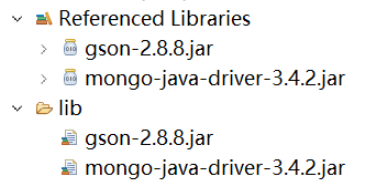这篇文章主要讲解了“Java连接MongoDB的常用方法实例分析”,文中的讲解内容简单清晰,易于学习与理解,下面请大家跟着小编的思路慢慢深入,一起来研究和学习“Java连接MongoDB的常用方法实例分析”吧!
1. 导入Mongo驱动包

2. 获取Mongo链接对象
MongoClient mc = new MongoClient("localhost",27017);3. 关闭链接
mc.close();
1. 获取库对象
MongoDatabase db = mc.getDatabase("myschool");2. 获取库中表的集合
MongoIterable<String> listCollectionNames = db.listCollectionNames();
MongoCursor<String> iterator = listCollectionNames.iterator();
while (iterator.hasNext()) {
System.out.println(iterator.next());
}a. 添加一条数据
//创建对象
Student s = new Student();
s.setSid(1);
s.setSname("王俊凯");
s.setBirthday(new Date());
s.setSsex("男");
s.setClassid(2);
//将数据转换为json格式
Gson gson = new GsonBuilder().setDateFormat("yyyy-MM-dd").create();
String json = gson.toJson(s);
//获取集合对象
MongoCollection<Document> collection = db.getCollection("student");
//添加一条数据,将json格式转换为document对象
collection.insertOne(Document.parse(json));b. 添加多条数据
//存入数据
List<Document> dlist=new ArrayList<Document>();
for(int i=0; i<3; i++){
Student s = new Student();
s.setSid(Integer.toString(i+1));
s.setSname("王源");
s.setBirthday(new Date());
s.setSsex("男");
s.setClassid(1);
//将数据转换为json格式
Gson gson = new GsonBuilder().setDateFormat("yyyy-MM-dd").create();
String json = gson.toJson(s);
dlist.add(Document.parse(json));
}
//获取集合对象
MongoCollection<Document> collection = db.getCollection("student");
//添加多条数据
collection.insertMany(dlist);a. 删除一条数据
//获取集合对象
MongoCollection<Document> collection = db.getCollection("student");
Student s = new Student();
s.setSid(1);
Gson gson = new GsonBuilder().setDateFormat("yyyy-MM-dd").create();
Bson bson = Document.parse(gson.toJson(s));
DeleteResult deleteOne = collection.deleteOne(bson);b. 删除多条数据
//获取集合对象
MongoCollection<Document> collection = db.getCollection("student");
Student s = new Student();
s.setSname("王源");
Gson gson = new GsonBuilder().setDateFormat("yyyy-MM-dd").create();
Bson bson = Document.parse(gson.toJson(s));
DeleteResult deleteMany = collection.deleteMany(bson);a. 修改一条数据
MongoCollection<Document> collection = db.getCollection("student");
//一个条件对象
Bson eq = Filters.eq("sname","易烊千玺");
//要修改的数据
Document doc = new Document();
doc.put("$set", new Document("age",22));
UpdateResult updateone = collection.updateOne(eq, doc);
System.out.println(updateone);b. 修改多条数据
MongoCollection<Document> collection = db.getCollection("student");
//多条件
Bson bson = Filters.and(Filters.gte("age", 20),Filters.lte("age", 40));
//要修改的数据
Document doc = new Document();
doc.put("$set", new Document("sex","男"));
UpdateResult updateMany = collection.updateMany(bson, doc);
System.out.println(updateMany);a. 全查
MongoCollection<Document> collection = db.getCollection("student");
FindIterable<Document> findAll = collection.find();
MongoCursor<Document> iterator = findAll.iterator();
while(iterator.hasNext()){
System.out.println(iterator.next());
}b. 带条件查询
MongoCollection<Document> collection = db.getCollection("student");
//一个条件对象
Bson eq = Filters.eq("sname","易烊千玺");
FindIterable<Document> findOne = collection.find(eq);
MongoCursor<Document> iterator = findOne.iterator();
while(iterator.hasNext()){
System.out.println(iterator.next());
}c. 模糊查询
MongoCollection<Document> collection = db.getCollection("student");
//使用正则表达式进行模糊查找
Bson eq = Filters.regex("sname","易");
FindIterable<Document> find = collection.find(eq);
MongoCursor<Document> iterator = find.iterator();
while(iterator.hasNext()){
System.out.println(iterator.next());
}d. 分页查询
MongoCollection<Document> collection = db.getCollection("student");
//分页查询
FindIterable<Document> find = collection.find().skip(2).limit(3);
MongoCursor<Document> iterator = find.iterator();
while(iterator.hasNext()){
System.out.println(iterator.next());
}e. 排序查询
MongoCollection<Document> collection = db.getCollection("student");
//排序查询 1升序 -1降序
Bson bson = new Document("sid",1);
FindIterable<Document> find = collection.find().sort(bson);
MongoCursor<Document> iterator = find.iterator();
while(iterator.hasNext()){
System.out.println(iterator.next());
}感谢各位的阅读,以上就是“Java连接MongoDB的常用方法实例分析”的内容了,经过本文的学习后,相信大家对Java连接MongoDB的常用方法实例分析这一问题有了更深刻的体会,具体使用情况还需要大家实践验证。这里是亿速云,小编将为大家推送更多相关知识点的文章,欢迎关注!
免责声明:本站发布的内容(图片、视频和文字)以原创、转载和分享为主,文章观点不代表本网站立场,如果涉及侵权请联系站长邮箱:is@yisu.com进行举报,并提供相关证据,一经查实,将立刻删除涉嫌侵权内容。